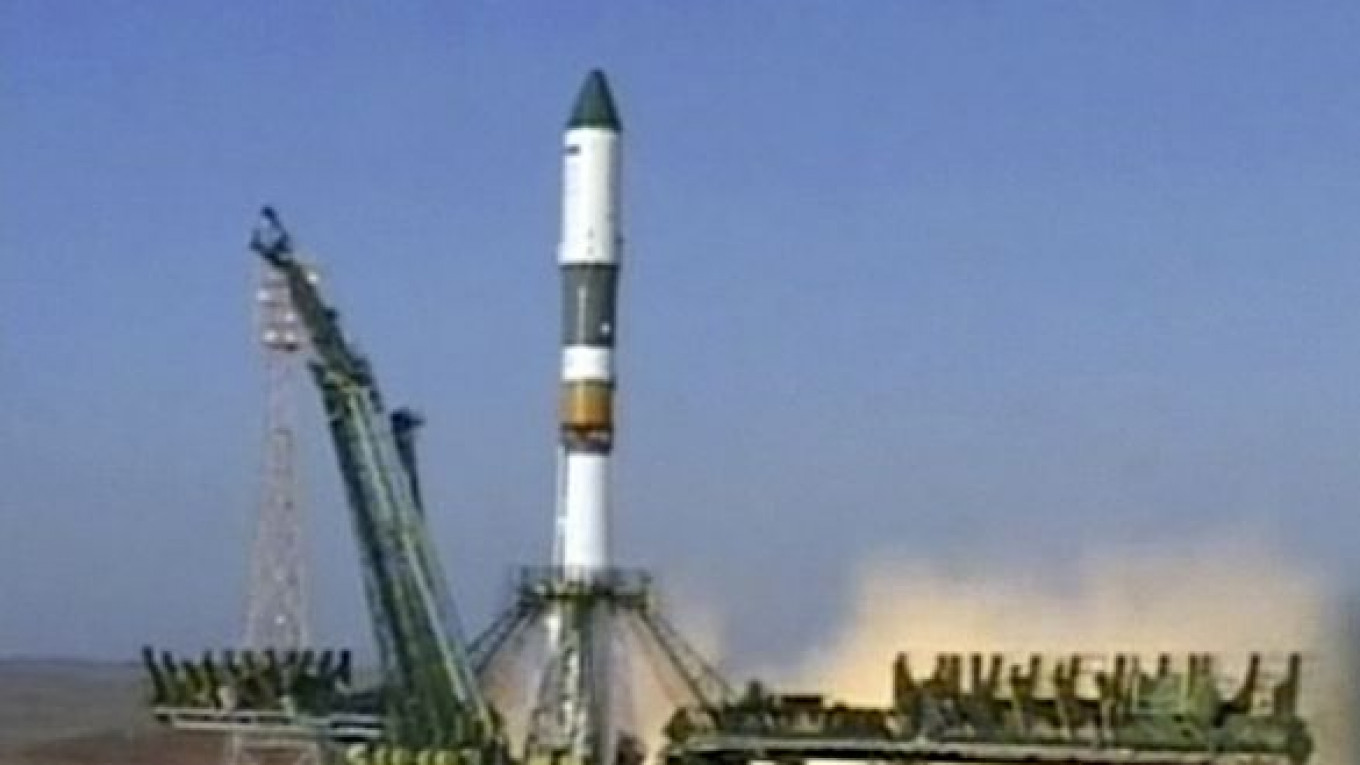An unmanned Progress supply ship bound for the International Space Station failed to reach its planned orbit Wednesday, and pieces of it fell in Siberia amid a thunderous explosion, officials said.
A brief statement from the Federal Space Agency did not specify whether the supply ship that was launched from the Baikonur Cosmodrome in Kazakhstan had been lost.
But Alexander Borisov, head of the Choisky district in the Altai republic, said pieces of the craft fell in his area some 1,500 kilometers northeast of the launch site, RIA-Novosti reported.
"The explosion was so strong that for 100 kilometers glass almost flew out of the windows," he said.
Borisov said there were no immediate reports of casualties.
The Emergency Situations Ministry could not be reached for comment.
A Federal Space Agency media officer who refused to be identified said the agency had no immediate comment.
The space agency statement said the third stage of the rocket firing the ship into space had failed at 325 seconds into the launch.
The ship was carrying more than 2.5 tons of supplies, including oxygen, food and fuel. Since the U.S. ended its space shuttle program this summer, Russian spaceships are a main supply link to the space station. It was the 44th Progress to launch to the International Space Station.
The space agency said the accident "would have no negative influence" on the International Space Station crew because its existing supplies of food, water and oxygen are sufficient.
In the United States, NASA said the rocket appeared to function flawlessly at liftoff, which occurred right on time, but there was a loss of contact with the vehicle just over five minutes into the flight.
On NASA TV, Russian officials said the upper stage did not separate from the supply ship and that on two subsequent orbits controllers tried to contact the supply ship — in vain. Two hours after the mishap, Russian Mission Control told the space station crew: "We'll try to figure it out."
NASA is counting on Russia as well as Japan and Europe to keep the orbiting outpost stocked, now that the space shuttles are no longer flying. The shuttle program ended in July with the Atlantis mission; a year's worth of food and other provisions were delivered.
Late this year, a commercial company in California plans to launch its own rocket and supply ship to the space station. NASA is encouraging private enterprise to make station deliveries.
There are six astronauts aboard the International Space Station, which orbits 350 kilometers above Earth. They are Russians Andrei Borisenko, Alexander Samokuyayev and Sergei Volkov, Americans Michael Fossum and Ronald Garan and Satoshi Furukawa of Japan.
"The supplies aboard the space station are actually pretty fat" after the resupply mission by space shuttle Atlantis in July, NASA spokesman Kelly Humphries said from Houston. "So we don't anticipate any immediate impact on the crew."
Humphries stressed that NASA was waiting to get more details from Russian space officials on what actually happened.
Interfax, citing space analyst Sergei Puzanov, reported that the space station had supplies aboard that could last two to three months and "the situation with the loss of the Progress cannot be called critical."
In July 2010, a Progress supply ship failed in its first automatic docking attempt due to an equipment malfunction, but was connected with the orbiting laboratory two days later.
A Message from The Moscow Times:
Dear readers,
We are facing unprecedented challenges. Russia's Prosecutor General's Office has designated The Moscow Times as an "undesirable" organization, criminalizing our work and putting our staff at risk of prosecution. This follows our earlier unjust labeling as a "foreign agent."
These actions are direct attempts to silence independent journalism in Russia. The authorities claim our work "discredits the decisions of the Russian leadership." We see things differently: we strive to provide accurate, unbiased reporting on Russia.
We, the journalists of The Moscow Times, refuse to be silenced. But to continue our work, we need your help.
Your support, no matter how small, makes a world of difference. If you can, please support us monthly starting from just $2. It's quick to set up, and every contribution makes a significant impact.
By supporting The Moscow Times, you're defending open, independent journalism in the face of repression. Thank you for standing with us.
Remind me later.






